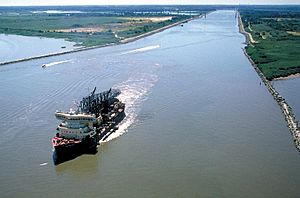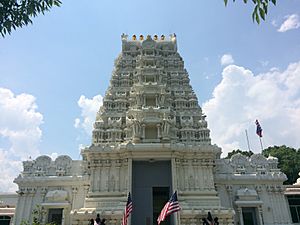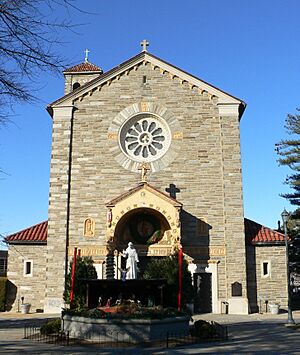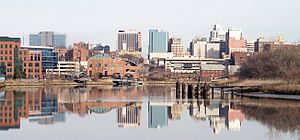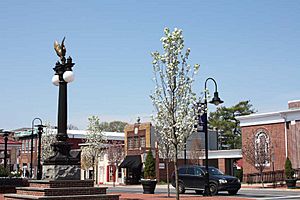New Castle County, Delaware facts for kids
Quick facts for kids
New Castle County
|
|||
|---|---|---|---|
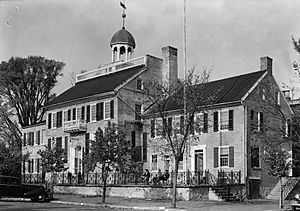
Old New Castle Courthouse in New Castle (1936)
|
|||
|
|||

Location within the U.S. state of Delaware
|
|||
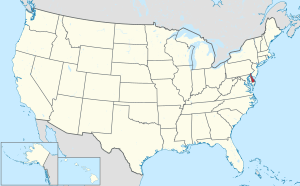 Delaware's location within the U.S. |
|||
| Country | |||
| State | |||
| Founded | August 8, 1673 | ||
| Named for | William Cavendish, 1st Duke of Newcastle | ||
| Seat | Wilmington | ||
| Largest city | Wilmington | ||
| Area | |||
| • Total | 494 sq mi (1,280 km2) | ||
| • Land | 426 sq mi (1,100 km2) | ||
| • Water | 68 sq mi (180 km2) 13.8% | ||
| Population
(2020)
|
|||
| • Total | 570,719 | ||
| • Estimate
(2023)
|
578,592 |
||
| • Density | 1,155.3/sq mi (446.1/km2) | ||
| Time zone | UTC−5 (Eastern) | ||
| • Summer (DST) | UTC−4 (EDT) | ||
| Congressional district | At-large | ||
New Castle County is the northernmost of the three counties in the state of Delaware. The other two counties are Kent and Sussex. In 2020, about 570,719 people lived here. This makes it the most populated county in Delaware, holding almost 60% of the state's total population.
The main city and county seat is Wilmington. It is also the largest city in Delaware. New Castle County is part of a larger metropolitan area that includes Philadelphia, Camden, and Wilmington. The county is named after William Cavendish, who was the first Duke of Newcastle. New Castle County has the most people and is the most developed of Delaware's counties. It is also the smallest in terms of land area.
Contents
History of New Castle County
The first permanent European settlement in Delaware was Fort Christina. It was started in 1638 by Peter Minuit and his team from Sweden. They arrived on ships called Fogel Grip and Kalmar Nyckel. The Swedes built their town where Wilmington is today. They bought land from the Lenape Native Americans. This land stretched from Old Cape Henlopen north to Sankikans (Trenton Falls).
However, the Dutch also claimed this land. In 1640, the area known as New Sweden was founded a few miles south of the Christina. In 1644, Queen Christina of Sweden appointed Lt. Col. Johan Printz as Governor of New Sweden. He set up the government on Tinicum Island.
In 1651, Peter Stuyvesant, who was the Governor of New Netherland (Dutch territory), sailed up the South River. He bought land from the Lenape that overlapped with what the Swedes had bought. Stuyvesant then started building Fort Casimir in what is now New Castle.
In 1654, the Swedes, led by Johan Risingh, took over Fort Casimir and renamed it Fort Trinity. This gave the Swedes control of the west side of the Delaware River. But the Dutch quickly fought back. In 1655, Stuyvesant returned and took back Fort Casimir, renaming it to its original name. Soon after, the Dutch also captured Fort Christina, which they renamed Fort Altena. This meant the Dutch were in charge again. New Amstel became the capital of the Dutch colony.
In 1663, the Dutch transferred their land rights along the Delaware River to England. The next year, in 1664, James, the Duke of York, was given this land by King Charles II. He ordered all Dutch people to leave New Amsterdam and renamed New Amstel to New Castle. In 1672, New Castle became an official town under English law.
However, in 1673, the Dutch attacked again and took the territory back. They established New Amstel in what is now Delaware. But this control didn't last long. On February 9, 1674, the land was given back to the British under the Treaty of Westminster. New Amstel was renamed New Castle again in November 1674.
On September 22, 1676, New Castle County officially came under the Duke of York's laws. It gained more land from Upland County in 1678. In 1680, St. Jones County was created from New Castle County. Today, this is known as Kent County, Delaware. Finally, in 1682, New Castle County and the surrounding land were given to William Penn. He then established the Colony of Delaware.
The northern border of New Castle County was set in 1681 with a special "12-mile arc" drawn from the town of New Castle. In 1685, the western border was also officially set.
Geography of New Castle County
New Castle County covers about 494 square miles. About 426 square miles is land, and 68 square miles (13.8%) is water. The county's borders are clearly defined in Delaware's laws. Rivers and creeks like Brandywine Creek and Christina River flow through it. The eastern side of the county is next to the Delaware River and Delaware Bay.
Interestingly, two small parts of New Castle County are actually across the Delaware River in New Jersey. These are Finns Point and the northern tip of Artificial Island.
Like all counties in Delaware, New Castle County is divided into smaller areas called "hundreds." There are eleven hundreds in New Castle County: Brandywine, Christiana, Wilmington (the city of Wilmington is its own hundred), Mill Creek, White Clay Creek, Pencader, New Castle, Red Lion, St. Georges, Appoquinimink, and Blackbird.
The highest natural point in Delaware, called Ebright Azimuth, is located in New Castle County. It is about 448 feet high.
The Chesapeake and Delaware Canal was built through New Castle County between 1822 and 1829. This canal connects the Chesapeake Bay with the Delaware River.
Neighboring Counties
New Castle County shares borders with several other counties:
- Chester County, Pennsylvania – to the northwest
- Delaware County, Pennsylvania – to the north
- Gloucester County, New Jersey – to the northeast
- Salem County, New Jersey – to the east
- Kent County, Delaware – to the south
- Kent County, Maryland – to the southwest
- Cecil County, Maryland – to the west
Main Roads and Highways
Climate in New Castle County
Most of New Castle County has a humid subtropical climate. This means it has hot, humid summers and mild winters. The very highest parts of the county, near Ebright Azimuth, have a hot-summer humid continental climate. This climate has more extreme temperatures.
| Climate data for Wilmington, Delaware (New Castle County Airport), 1981–2010 normals, extremes 1894–present | |||||||||||||
|---|---|---|---|---|---|---|---|---|---|---|---|---|---|
| Month | Jan | Feb | Mar | Apr | May | Jun | Jul | Aug | Sep | Oct | Nov | Dec | Year |
| Record high °F (°C) | 75 (24) |
78 (26) |
86 (30) |
97 (36) |
98 (37) |
102 (39) |
106 (41) |
107 (42) |
100 (38) |
98 (37) |
85 (29) |
75 (24) |
107 (42) |
| Mean maximum °F (°C) | 61.2 (16.2) |
63.1 (17.3) |
73.7 (23.2) |
82.6 (28.1) |
88.3 (31.3) |
93.2 (34.0) |
96.0 (35.6) |
93.7 (34.3) |
89.1 (31.7) |
81.6 (27.6) |
72.5 (22.5) |
63.9 (17.7) |
96.9 (36.1) |
| Mean daily maximum °F (°C) | 40.2 (4.6) |
43.5 (6.4) |
52.4 (11.3) |
63.5 (17.5) |
73.0 (22.8) |
81.8 (27.7) |
86.1 (30.1) |
84.2 (29.0) |
77.4 (25.2) |
66.2 (19.0) |
55.7 (13.2) |
44.6 (7.0) |
64.1 (17.8) |
| Mean daily minimum °F (°C) | 24.6 (−4.1) |
26.8 (−2.9) |
33.6 (0.9) |
43.0 (6.1) |
52.6 (11.4) |
62.6 (17.0) |
67.6 (19.8) |
66.1 (18.9) |
58.2 (14.6) |
46.1 (7.8) |
37.4 (3.0) |
28.7 (−1.8) |
45.7 (7.6) |
| Mean minimum °F (°C) | 7.4 (−13.7) |
11.6 (−11.3) |
17.9 (−7.8) |
29.7 (−1.3) |
38.7 (3.7) |
49.9 (9.9) |
56.7 (13.7) |
54.3 (12.4) |
43.7 (6.5) |
32.8 (0.4) |
23.3 (−4.8) |
13.6 (−10.2) |
4.3 (−15.4) |
| Record low °F (°C) | −14 (−26) |
−15 (−26) |
2 (−17) |
11 (−12) |
30 (−1) |
40 (4) |
48 (9) |
43 (6) |
32 (0) |
23 (−5) |
11 (−12) |
−7 (−22) |
−15 (−26) |
| Average precipitation inches (mm) | 3.01 (76) |
2.68 (68) |
3.92 (100) |
3.50 (89) |
3.95 (100) |
3.88 (99) |
4.57 (116) |
3.25 (83) |
4.32 (110) |
3.42 (87) |
3.10 (79) |
3.48 (88) |
43.08 (1,094) |
| Average snowfall inches (cm) | 5.9 (15) |
8.3 (21) |
1.9 (4.8) |
0.3 (0.76) |
0 (0) |
0 (0) |
0 (0) |
0 (0) |
0 (0) |
0 (0) |
0.4 (1.0) |
3.4 (8.6) |
20.2 (51) |
| Average precipitation days (≥ 0.01 in) | 10.5 | 9.4 | 10.7 | 11.3 | 11.2 | 10.3 | 9.9 | 8.1 | 8.5 | 8.3 | 9.2 | 10.3 | 117.7 |
| Average snowy days (≥ 0.1 in) | 4.3 | 3.6 | 1.3 | 0.4 | 0 | 0 | 0 | 0 | 0 | 0 | 0.2 | 2.0 | 11.8 |
| Source: NOAA | |||||||||||||
People of New Castle County
| Historical population | |||
|---|---|---|---|
| Census | Pop. | %± | |
| 1790 | 19,688 | — | |
| 1800 | 25,361 | 28.8% | |
| 1810 | 24,429 | −3.7% | |
| 1820 | 27,899 | 14.2% | |
| 1830 | 29,720 | 6.5% | |
| 1840 | 33,120 | 11.4% | |
| 1850 | 42,780 | 29.2% | |
| 1860 | 54,797 | 28.1% | |
| 1870 | 63,515 | 15.9% | |
| 1880 | 77,716 | 22.4% | |
| 1890 | 97,182 | 25.0% | |
| 1900 | 109,697 | 12.9% | |
| 1910 | 123,188 | 12.3% | |
| 1920 | 148,239 | 20.3% | |
| 1930 | 161,032 | 8.6% | |
| 1940 | 179,562 | 11.5% | |
| 1950 | 218,879 | 21.9% | |
| 1960 | 307,446 | 40.5% | |
| 1970 | 385,856 | 25.5% | |
| 1980 | 398,115 | 3.2% | |
| 1990 | 441,946 | 11.0% | |
| 2000 | 500,265 | 13.2% | |
| 2010 | 538,479 | 7.6% | |
| 2020 | 570,719 | 6.0% | |
| 2023 (est.) | 578,592 | 7.4% | |
| U.S. Decennial Census 1790-1960 1900-1990 1990-2000 2010-2020 |
|||
In 2010, there were 538,479 people living in New Castle County. The population density was about 1,263 people per square mile. The county was made up of different racial groups: 65.5% White, 23.7% Black or African American, 4.3% Asian, and 0.3% American Indian. About 8.7% of the population was of Hispanic or Latino origin.
Many people in the county have roots from different countries. The most common ancestries were Irish (19.2%), German (15.0%), and Italian (11.7%).
By the 2020 census, the population grew to 570,719 people. In 2021, estimates showed that the racial and ethnic makeup was about 54.8% non-Hispanic White, 27.2% African American, and 6.0% Asian. About 11% of the population was Hispanic or Latino.
Communities in New Castle County
New Castle County is home to two professional sports teams. The Wilmington Blue Rocks play baseball, and the Delaware Blue Coats play basketball. Both teams play in Wilmington. There is also a car racing track called Airport Speedway in New Castle. Races happen there on Saturday nights during the summer.
Cities in New Castle County
Towns in New Castle County
- Bellefonte
- Clayton (partly in Kent County)
- Elsmere
- Middletown
- Newport
- Odessa
- Smyrna (partly in Kent County)
- Townsend
Villages in New Castle County
Census-Designated Places
These are areas that are like towns but are not officially incorporated as cities or towns.
Unincorporated Communities
These are smaller communities that are not officially part of a city or town.
- Appoquinimink Hundred
- Alapocas
- Centerville
- Christiana
- Collins Park
- Granogue
- Holly Oak
- Marshallton
- Mill Creek
- Minquadale
- Montchanin
- Mount Pleasant
- Ogletown
- Port Penn
- Rockland
- Stanton
- Wooddale
Education in New Castle County
New Castle County has many schools and colleges.
School Districts
- Appoquinimink School District
- Brandywine School District
- Christina School District
- Colonial School District
- Red Clay Consolidated School District
- Smyrna School District
There is also a county-wide school district for technical and vocational training: New Castle County Vocational-Technical School District.
State-Operated Schools
- Delaware School for the Deaf
Colleges and Universities
- Delaware College of Art & Design
- Delaware State University – Wilmington Campus
- Delaware Technical & Community College – Wilmington Campus
- Goldey-Beacom College
- University of Delaware – Main Campus, Wilmington Campus and Downtown Building
- Wilmington University – Wilmington Campus
- Widener University Delaware Law School
See also
 In Spanish: Condado de New Castle para niños
In Spanish: Condado de New Castle para niños




